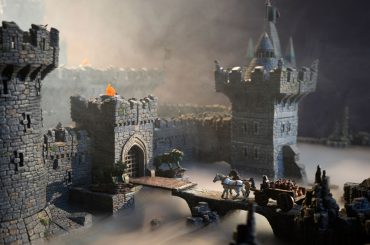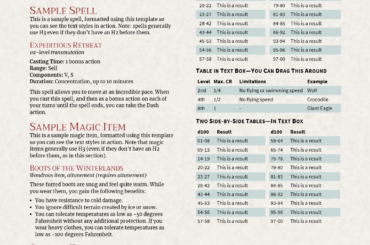Even before the Coronavirus pandemic, anyone who would play D&D regularly knows the challenges of getting a game together to play with a diverse group of friends. Now, with many of us in lockdown and social distancing ourselves for safety, the challenges of running a campaign have gotten even more difficult.
There’s several options available to help you play D&D online, but it can be hard to know what the best options are. For some people old-fashioned PBEM (play by email) may be a good option. These days, however, there are many virtual tabletops which can allow you to do everything from rolling virtual dice to sharing battlemaps.
Here are some of the best tools available to let you play even if your GM is in complete lockdown.
Roll20

Roll20 is perhaps the most popular virtual tabletop system out there to play D&D online, with over four million users.
Pros:
- Basic membership is free, and you can run a game without a paid account, although some features such as dynamic lighting need a paid account.
- It has a large community and a player directory that makes it easy to find campaigns and players.
- It covers most popular systems.
- It has voice and video chat.
- The system is entirely browser-based, with no need to install anything.
Cons:
- Roll20 contains a large number of integrated rulebooks and adventures. However, you have to pay for each one, even if you already own a hardcopy of the book.
- The video chat can be very glitchy at some times, and some people resort to using Skype as a backup.
Astral Tabletop

Although less well known than Roll20, Astral Tabletop has just as many features.
Pros:
- Astral has one of the best online map creators. It’s so good some people use it for their face to face campaigns.
- You can easily run a campaign from a free account, with the paid tiers providing optional extras such as random NPC generation. There is no base functionality at the paid level.
- Paid accounts get access to a huge library of character tokens, map tiles, sound effects, etc.
- It is entirely browser-based with no need for anything to be installed.
Cons:
- It only really offers full support for 5E, although it’s absolutely fantastic for that system.
- There are no adventure modules built in to the system.
- It has almost no customization, including of character sheets.
Foundry VTT

Foundry Virtual Tabletop is aimed at serious GMs, and it has an excellent UI and gives you more control.
Pros:
- If you are technically savvy, Foundry offers some of the best customization, and you can install your own modules easily. They have an awesome API which you can use, if you have the skill, to add your own homebrews to the system. You can also upload your own compendiums.
- It is cheaper than Roll20 or FG, with no cost for players and the GM license is going to be a one-time purchase. However, you will not be able to GM without buying a license.
- There is no cost for extras like rulebooks.
Cons:
- The GM has to run the software on their own system. While this gives more storage space and control, it may cause issues if the GM is having computer problems.
- There’s no marketplace system for buying books. You will need to install modules yourself for integrated rulesets.
- It’s still in beta, although full release should be by the end of 2019.
- There is no video or audio chat available, meaning you will have to use Skype or Discord for chat.
Fantasy Grounds

Fantasy Grounds is probably the most popular VTT system after Roll20to play D&D online. Many serious GMs swear by the system, which can be purchased either as a subscription or a one shot. It has even more integrated rulebooks than Roll20. It also works better if you need a system as a supplement to a live campaign – which is great for those situations where you might find you have to do the occasional session online because somebody has a new puppy they can’t leave unattended.
Pros:
- It includes support for every major system.
- It has a very high level of automation, including spell effects and inventory tracking.
- Books are cheaper than on Roll20, and FG can end up quite a bit cheaper if you run multiple campaigns in multiple systems.
- It is integrated with DMs Guild, which allows you to pull in large numbers of third party adventures.
Cons:
- It is harder to use and has a steep learning complexity.
- No dynamic lighting.
- Either the GM has to have the highest paid tier or all players have to pay. Depending on the group this may make it much more expensive.
- You cannot GM from a free account.
- All players have to install an app, which is for Windows, Mac or Linux. There is no Android or iPad option.
D20 Pro

D20 Pro is similar to Fantasy Grounds. It is cheaper, but you get less for it – they don’t have, for example, Pathfinder content beyond the core rulebook, although it’s promised soon.
Pros:
- The payment is a reasonable one-time fee rather than a subscription.
- Character sheets are great.
- The map sharing capabilities are higher than on many other virtual tabletop systems.
- It has a highly active (if small) community.
Cons:
- It uses a cross platform Java application, which you have to install.
- You can only have two players at the table who don’t have to pay. Everyone else has to pay. The guest seats are intended for occasional visitors to your campaign.
- Setting up the server to host games requires a bit of technical knowledge if you want to play D&D online.
- It does not have integrated video chat, so you will need to have Skype or similar.
There are a number of other virtual tabletop systems out there that are less popular than the ones outlined above:
Role Gate
GM Forge
RP Tools
3D Virtual Tabletop
ArkenForge
ScreenMonkey
iTabletop
EpicTable
Beyond Tabletop
AGF Pro + Battlemap
Revolution Virtual Playspace
Skirmish! Virtual TableTop
Infinitas DM
OpenRPG
OpenRPG+
Infrno
TTopRPG 2.0
Rolistik (french)
Dices ORPS
Dungeon Helper
RPG Manager
VTable
RPGrounds
Live-Tabletop
Fabletop
Sandstorm
Skwyre
Tabletop Simulator
It’s worth taking a quick look around the internet if none of these work for you. If you want to play D&D online, then there are plenty of options for you and your players, some of which require little or no computer knowledge to use well.
Main photo: Barry Mazur/Flickr




